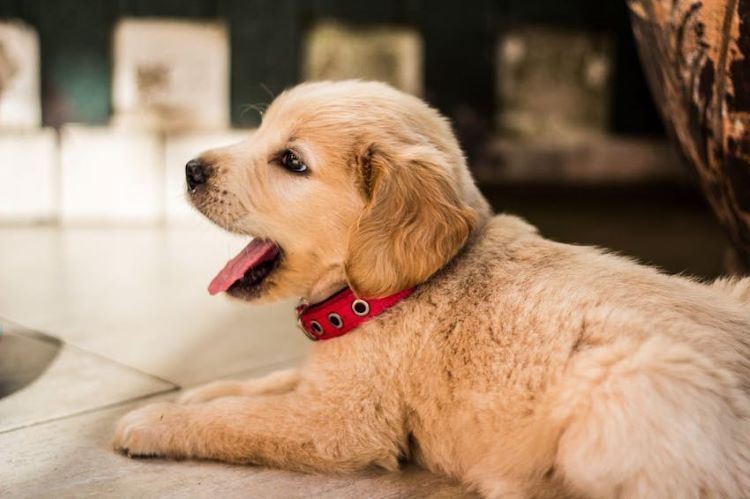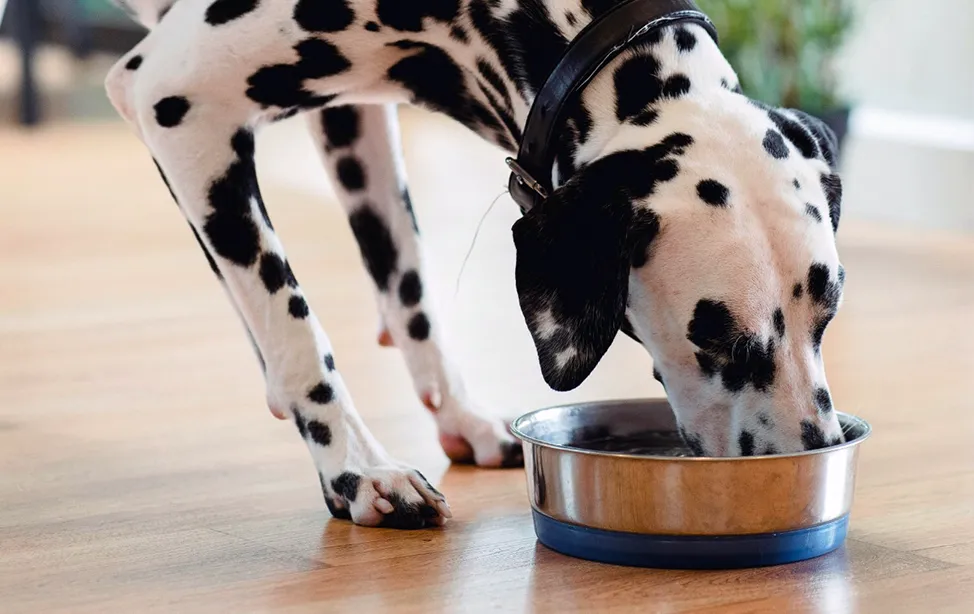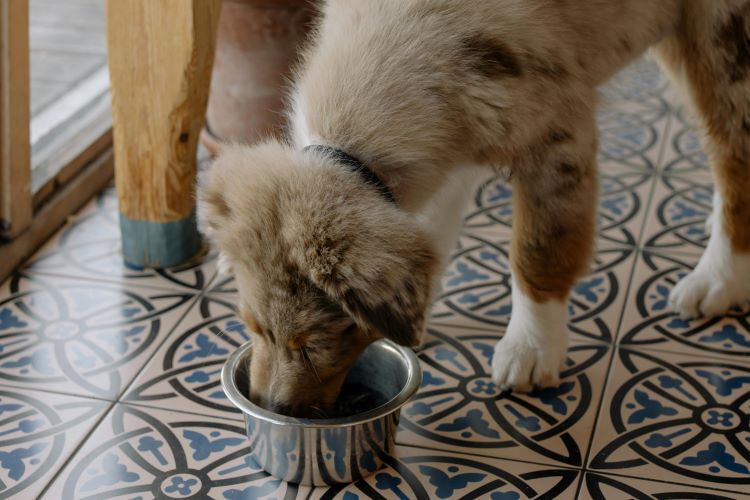Ready to help treat your pet to a healthy life?
How Much Water do Puppies Need to Drink per Day?
By : Brianna Gunter & Trupanion Staff | Updated Jul 3, 2025

Ever wondered how much water your new furry friend should be drinking? Keeping your puppy well-hydrated is crucial for their health (especially during the warmer months), but it’s not always clear just how much water they need. Puppies, like human babies, have different needs than their adult counterparts. Factors like their size, diet, activity level, and even the weather play a role in determining puppy hydration needs.
Feeling a bit lost? No worries! We’re pet owners ourselves at Trupanion (the folks behind Pet Parenting), and we’ve handled more than our fair share of puppy care. In this guide, we’ll break down the essentials of puppy hydration and give you the lowdown on how to ensure your pup gets just the right amount of daily liquids.
Just a heads up; all the water talk we’re about to do may get you pretty thirsty. So, grab some water of your own, and let’s dive into everything you need to know about keeping your puppy happy, healthy, and hydrated.
Why is my puppy’s water intake so important?
Dogs have a lot of natural instincts — shouldn’t one of them be to drink water to survive? While it is true that canines instinctively know to drink water to meet their thirst, they can still fall short, sometimes by a lot. Just like us, your dog may get distracted or become too engaged in their current activity to take a trip to the water bowl. It’s also worth noting that many dogs simply won’t drink from a bowl that is dirty or behind obstacles.
When it comes to puppies, monitoring their water intake is especially important. After all, puppies are still growing and have changing nutritional needs. They can also be quite rambunctious and tire out easily. In addition to needing plenty of water to help them stay healthy as they grow into adult dogs, puppies may simply need to learn water-drinking routines.
Dangers of dehydration in puppies
When your pet doesn’t get enough water, they can become dehydrated. Dehydrated puppies (and dogs in general) can experience serious symptoms, including poor circulation and overheating. Just as it does for humans (and all mammals here on Planet Earth), water plays a critical role in almost every organ and bodily system in a dog.
When dehydration isn't addressed, it can lead to serious illnesses in puppies or even death in just a matter of days. On that note, you suspect your puppy is dehydrated (or even drinking too much water), please seek medical attention immediately.
Alright, how do I know if my puppy is drinking enough water?
Even puppies that are still nursing may require some access to clean water, so if you aren't providing water for a puppy, the answer is no. In fact, as they're growing and learning, puppies may drink more water for their size than they will when they are adults.
However, how much water puppies need depends on a few key factors:
Factor 1: Puppy size and breed
You probably can't monitor every drop your puppy slurps, and that's okay. It's better to consider a unit of time (like a day) and your pet’s current weight to understand how much they’re drinking throughout that time period.
So, how much water should a puppy drink in 24 hours? A general rule to apply is between half an ounce and 1 ounce of water daily per pound. A puppy that weighs 10 pounds, then, might need 5 to 10 ounces of water, while a 30-pound puppy might need 15 to 30 ounces of water.
Your puppy’s breed can also affect how much water they need in any given day. Larger, faster-growing puppies typically need to consume more water compared to their smaller counterparts, but talk to your veterinarian for a better idea of what your pal needs.
Factor 2: Activity level
It's important to approach water consumption with the same common sense you might use for yourself. An active puppy or one that is working hard to learn and train may need more water than a less active pet. If your dog works up a good pant by running around the yard, they may need more than an ounce of water per pound that day.
Factor 3: External factors
Temperature is the obvious one here. High temperatures can make humans and puppies alike more thirsty, as our bodies work harder to keep cool and run efficiently. Always keep an eye on the weather before embarking on an adventure with your puppy, and be sure to bring along clean, fresh water wherever you go.
General humidity can also impact how much water your dog needs. That's especially true if your pup is used to a humid climate and you travel to a more arid environment — they may become thirstier faster.

Signs of dehydration in puppies
Because puppies are smaller than their adult counterparts, they might move from healthy levels of hydration to dehydration faster than older dogs. Being aware of the signs of dehydration in puppies can help you proactively care for your pet.
Dogs of any age that are suffering from dehydration may show symptoms such as:
- Appetite changes, specifically less of an appetite than normal or no interest in food
- Low energy levels as evidenced by just wanting to lay around or moving or reacting slower than normal
- Vomiting
- Eyes that appear to be more sunken into the skin than normal and look dry
- Dry areas that are normally damp in a healthy dog, such as the nose and gums
- Saliva or drool that is thicker or stickier than normal
You can do a few quick tests at home to check for dehydration in a puppy. For example, a pup's skin is normally fairly elastic, meaning it snaps back into place when pulled. If you stretch the skin at the scruff of your puppy's neck and it doesn't snap immediately back into place, that could be a sign of dehydration.
Another test is to press your finger gently but firmly on an area of the puppy's gums. This causes blood flow to slow to that area, and the area becomes whitish. If the area takes longer than 2 seconds to turn back to a regular pink color once you remove your finger, it might indicate dehydration.
Tips for increasing puppy water consumption
Start by knowing what to feed a puppy. Very young puppies may need water mixed into their food. This helps ensure they can eat and digest it well as well as get additional hydration.
On top of that, you’ll also want to:
- Be aware of your pet's habits — Some dogs don't like to drink out of a bowl that's almost empty, for example, and you may need to fill the bowl more often.
- Ensure your dog's water bowl is clean and fresh — This also helps to reduce the chance your dog drinks contaminated water.
- Provide ice cubes as a treat — Your dog may enjoy a refreshing cold crunch or lick on hot days.
- Flavor water bowls for picky pups — If your dog doesn't seem interested in their water bowl at all, you can add a bit of low-sodium chicken broth to increase interest.
- Bring water on outings — Puppies should always have access to clean, drinkable water. Whenever you’re stepping out on a walk or other adventure, be sure to bring along a portable puppy water bottle or dish with water to fill it.
If your puppy seems resistant to drinking much water or you notice other issues, schedule an appointment with their veterinarian.

Can puppies drink too much water?
Yes! Though this may seem odd, the truth is that over-hydration is also a thing that can negatively affect puppies. While drinking too much water itself can lead to detrimental health effects (namely hyponatremia or “water intoxication”), this usually involves extremely high quantities and is rare.
Instead, it’s the over-consumption of water itself that is often a sign of an underlying health condition in puppies. Healthy dogs of any age tend to regulate their own water intake and won't generally drink so much that it's a concern. If you notice your puppy drinking what seems like an excessive amount of water, talk to your veterinarian about puppy hydration and what might be normal for your dog. If your pup is overdoing it, your vet can run some tests to make sure there’s nothing to worry about.
When to talk to your pet's veterinarian
If you see any signs of hydration issues in your pet, reach out to your vet to discuss whether treatment for dehydration may be necessary. And as mentioned, it’s also important to ask questions if you suspect your pup may be overly hydrating. You may also want to talk to your vet if you aren't sure how much your dog should be drinking so you know how best to care for your pet.
Throughout your journey as a dog owner, health and wellness questions are likely to come up — and illnesses and emergencies can happen. Finding a veterinarian you like and establishing a trusting relationship with them is one of the first steps you should take as a new pet parent. And as you're learning more about caring for your new pet’s health, consider puppy insurance for peace of mind.
